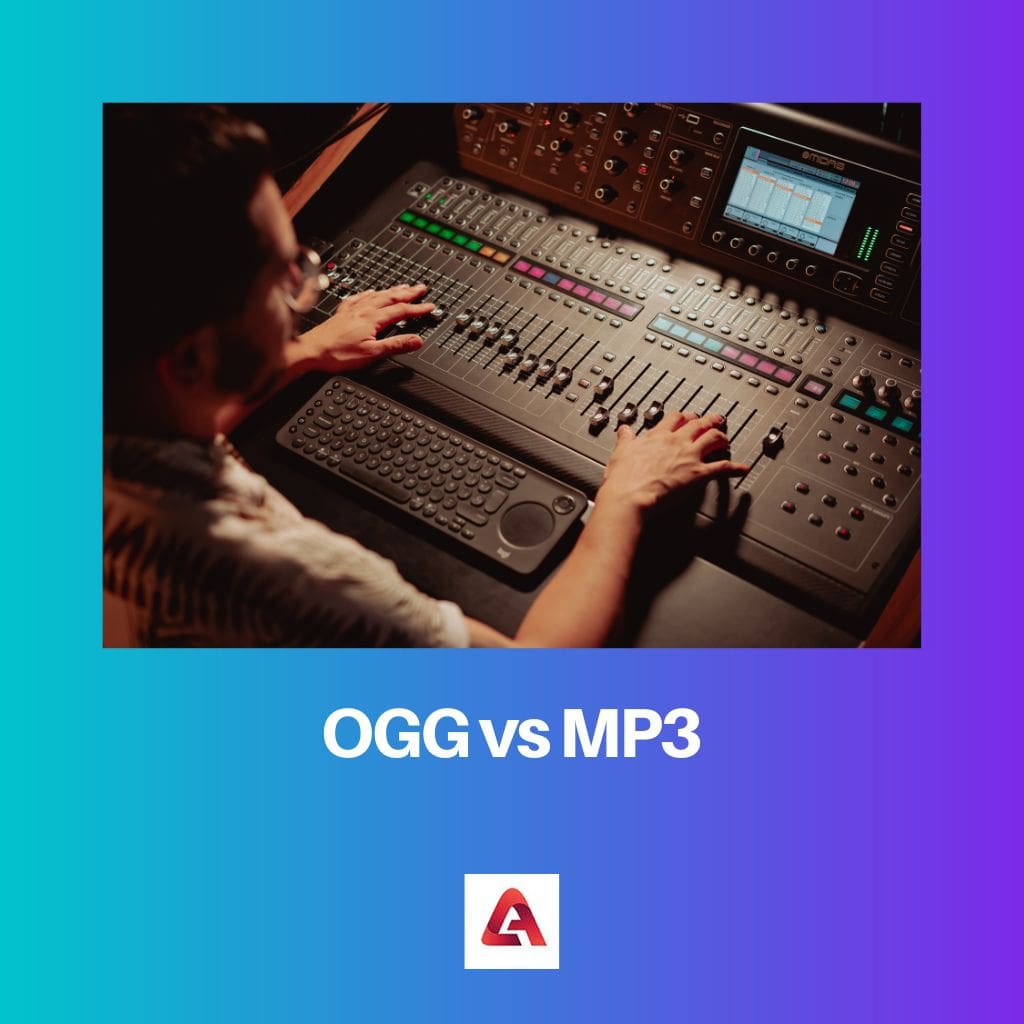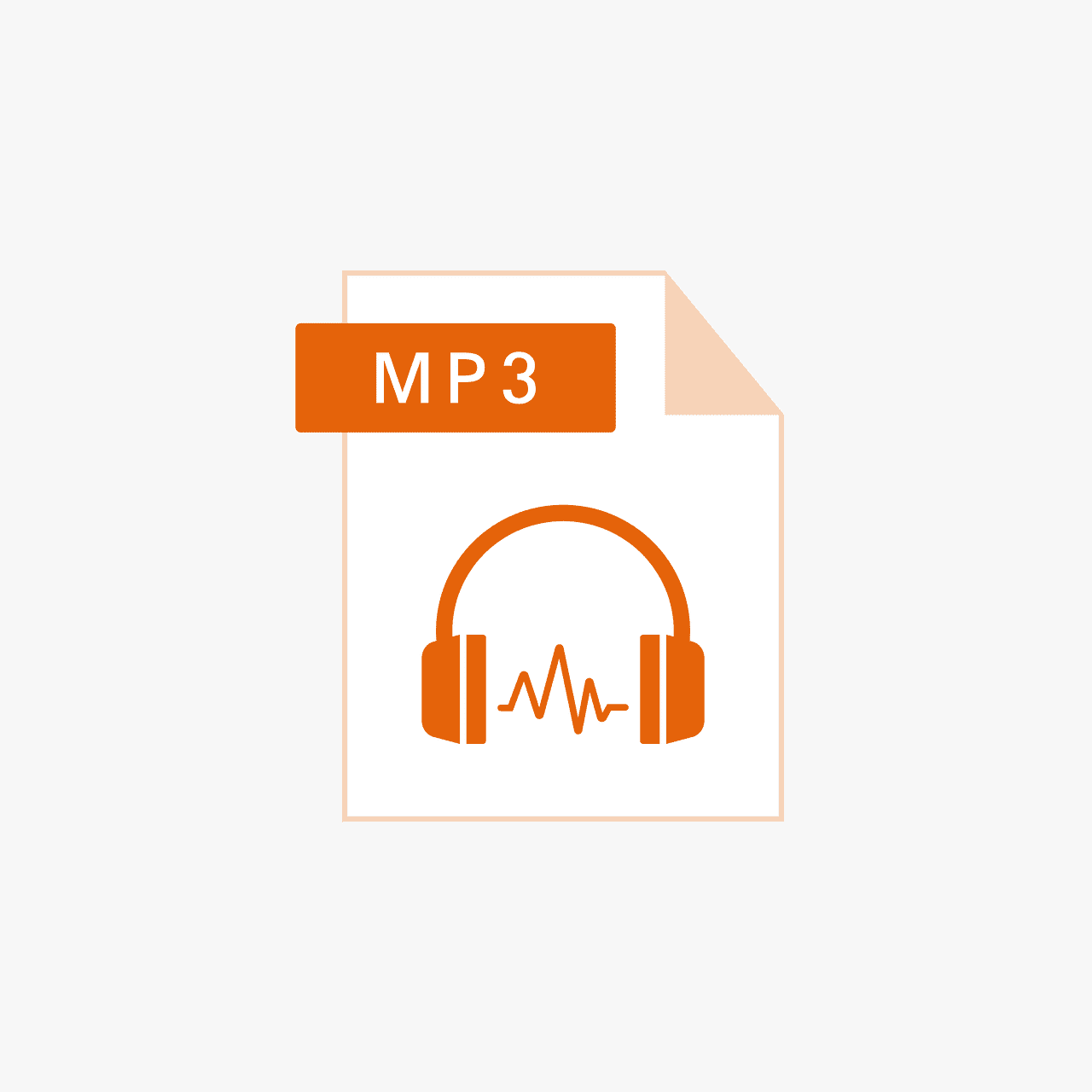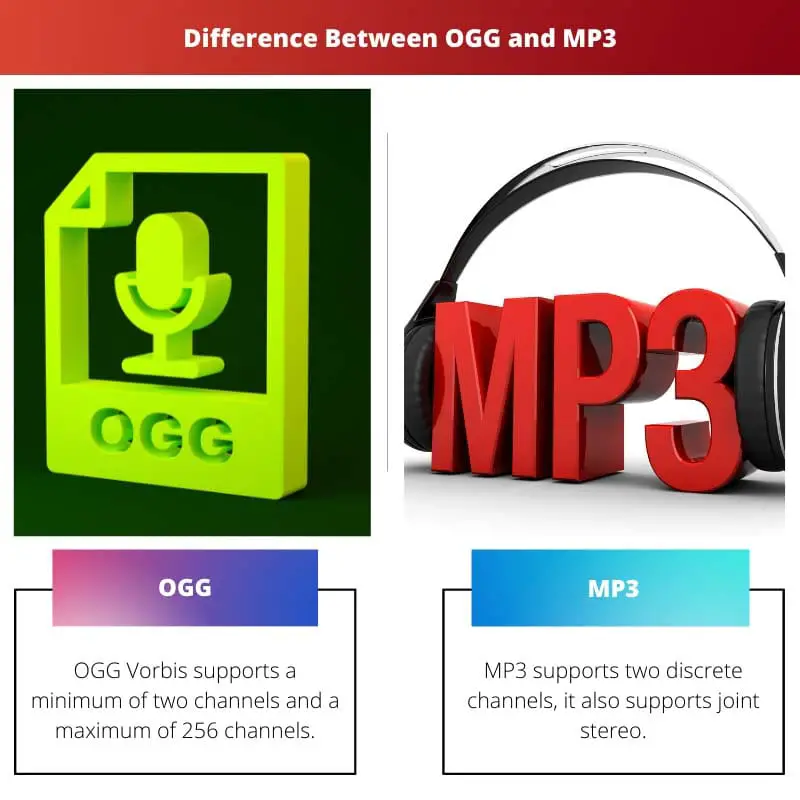There are many types of files, such as audio, video, image, document, etc. Each of these files has a different format audio can be in WAV, MPP3, OGG, AIFF, etc.
OGG and MP3 formats are lossy since they use the lossy technique to filter the audio ranges the human ear cannot hear.
Key Takeaways
- OGG is an open-source, patent-free audio compression format that provides high-quality audio at lower bitrates than other formats like MP3.
- MP3 is a widely-used, lossy audio compression format that balances file size and sound quality, making it popular for music and podcast distribution.
- The main differences between OGG and MP3 are their compression algorithms, licensing, and file sizes. OGG offers higher quality at lower bitrates, and MP3 is more widely accepted due to its popularity.
OGG vs. MP3
OGG is a free, open-source format that offers high sound quality and small file sizes. It is used for streaming audio and music files on the internet. MP3 is a common format that uses lossy compression to reduce file sizes while maintaining decent sound quality.

OGG Vorbis is an open-source audio format with better sound quality; it supports open audio encoding. One of the most important advantages of it is that the developers claim that the patent done by developers does not bind it.
MP3 is also an open-source lossy audio format; it is an open-source format, but, in some cases, the developers charge royalties for using this format. It is a proprietary audio media encoding format.
Comparison Table
| Parameter of Comparison | OGG | MP3 |
|---|---|---|
| Support | OGG Vorbis supports a minimum of two channels and a maximum of 256 channels. | MP3 supports two discrete channels; it also supports joint stereo. |
| Sound quality | OGG Vorbis has better sound quality. | MP3 has an inferior sound quality than OGG. |
| Compressed file | The compressed file of the OGG Vorbis format is smaller in size. | The compressed file of the MP3 format is larger than that of the OGG format. |
| Compression bit rate | The bit rate of compression in OGG Vorbis is variable; it changes according to the need of the file. | The bit rate of compression in the MP3 format is always constant. |
| Source | OGG Vorbis is an open-source format. | MP3 format is also an open source format; however, sometimes it is constrained because of the patent. |
What is OGG format?
One of the formats of audio files is the OGG format. OGG format was developed and maintained by the Xiph.Org foundation.
OGG is derived from the word “ogging,” taken from the game Netrek, which means doing things forcefully without considering future resources. OGG is a lossy audio format. Therefore, some data from the original file gets lost.
OGG Vorbis format supports two to 256 channels, the compressed file of the OGG format is smaller, and therefore it is easier to share them through channels with a certain limit of sharing files. The bit rate of compression in OGG Vorbis format varies according to the requirement of the file.
Encoding in OGG format has a speed of 192kbps. It is a kind of container format that is free of cost for everyone.
It has a Vorbis, Theora, Speex, Opus container, etc. It has a better quality of sound as compared to the MP3 format. It has extensions. Ogg, .ogv, .oga, .ogx, .opus, etc.
The OGG format began as a simple audio compression format. The initial OGG format was meant only for coding and decoding multimedia content; however, later, it was made free of cost to use by anyone.
What is MP3 format?
A format for coding digital audio is an MP3 format. It stands for MPEG-1 Audio Layer All, a successor of MPEG-1, and was referred to as its third audio format of it.
Thompson Multimedia and Fraunhofer Gesellschaft developed the MP3 format. MP3 is a lossy audio format; some of the data inaudible to the human ear is lost during filtering.
It is capable of supporting two discrete channels; it also supports joint stereos. The compressed file in MP3 format is larger than the one in OGG format, making it difficult to share.
The bit rate of compression in MP3 format is fixed or contact; that is, it does not vary according to the file. Encoding in MP3 format takes place with a speed of 128kbps.
It supports .mp3 and .bit( before 1995) extensions. It has a very normal sound quality which is inferior to the sound of the OGG format.
MP3 claims it is an open-source format; however, it is chargeable sometimes. MP3, despite its large file size, is the preferred format; it is a commonly used format for general files.

Main Differences Between OGG and MP3
- Xiph.org foundation developed the OGG Vorbis format, while Thompson Multimedia and Fraunhofer Gesellschaft developed the MP3 format.
- Both are open-source formats, but the parent of the developers sometimes binds MP3.
- OGG is a format that supports open audio encoding, while MP3 is a proprietary encoding format.
- Encoding in OGG Vorbis format takes place with a speed of 192kbps, while in MP3 format, the encoding speed is 128kbps; therefore, on the encoding front, OGG is better than MP3.
- OGG Vorbis supports a minimum of two channels and a maximum of 256 channels, while MP3 format supports two discrete channels and a joint stereo.
- OGG Vorbis has better sound quality than MP3.
- The compressed file in OGG Vorbis format is smaller than the compressed file in the MP3 format.
- The bit rate of compression in OGG format varies according to the requirement of the file, while the bit rate of compression is constant in MP3 format.
- MP3 is a more popular and more widely used format than OGG.


I never knew the specifics of the OGG and MP3 formats. This article has truly broadened my knowledge.
This article is very informative. The differences between OGG and MP3 formats are well-detailed. Really helpful comparative analysis.
I completely agree. This article has made it very clear why OGG and MP3 are the two most common types of audio formats.
The article provides a comprehensive comparison between OGG and MP3. It’s clear that OGG is the superior choice for quality and compression.
While the technical details are good, it would have been better to have a more engaging tone and less technical jargon.
I agree. It was a bit dry with all the technical details.